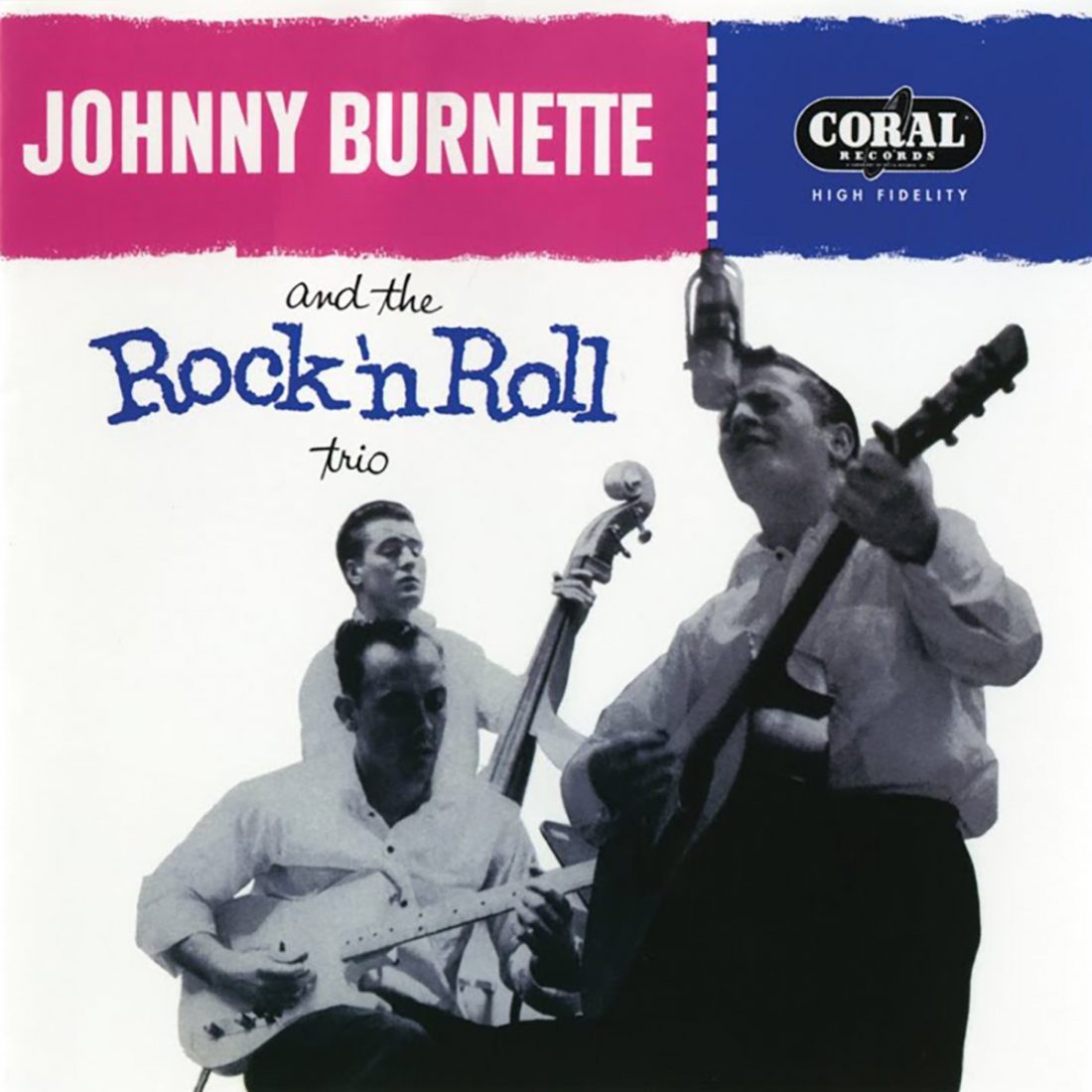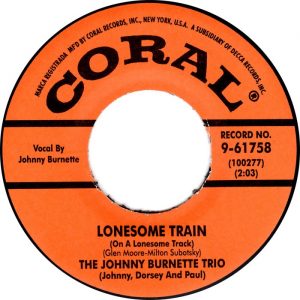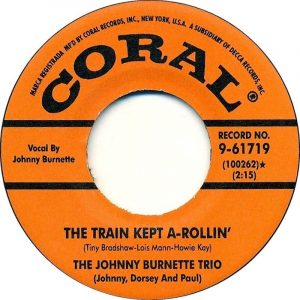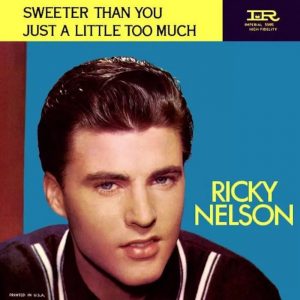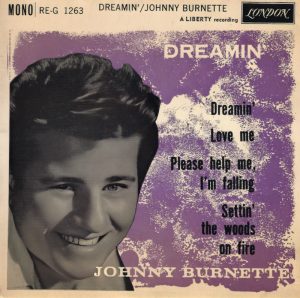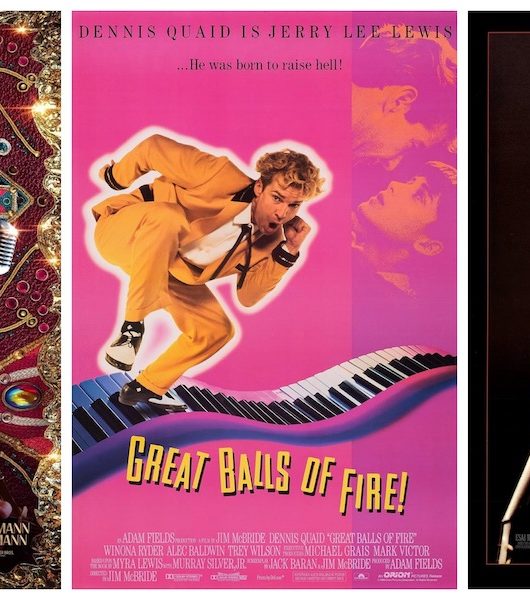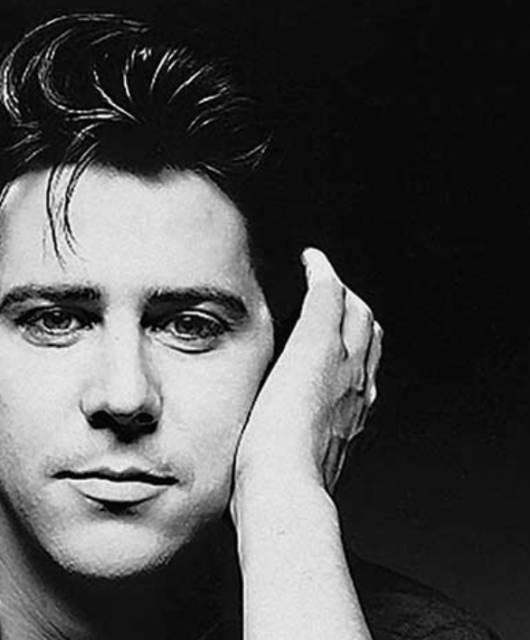On 14 August 1964, the hot-rockin’ career of Johnny Burnette was tragically cut short when he died in a boating accident on Clear Lake, California. On the 60th anniversary of his passing, Vintage Rock meets his son Rocky to celebrate the Rock’n’Roll Trio’s lasting legacy.
When unleashed their fiery eponymous full-length album on an unsuspecting public in December 1956, the world was not ready. Bursting with bravado and rebellion, there was a ferality to the raw rockabilly contained within its 12 tracks that sounded like danger, like excitement… like the future.
There’s still an urgency to incendiary cuts such as Honey Hush, Lonesome Train (On A Lonesome Track), All By Myself, The Train Kept A-Rollin’ and Drinking Wine, Spo-Dee-O-Dee, that permeates all these years later. Looking back, perhaps the uncompromising nature of the volatile Burnette brothers, Johnny and Dorsey, alongside the visionary six-string of Paul Burlison, was simply too hot to handle for audiences at the time.
Fast forward to 14 August 1964, and the rock’n’roll world was dealt a brutal blow when the career of Johnny Burnette was cut short and his life cruelly taken following a boating accident, aged just 30.
Terrible loss
“We had gone up to Clear Lake three years in a row,” Johnny’s eldest son Rocky tells Vintage Rock. “It was a great place to go fishing, and that’s what my dad loved to do. However, that’s probably one vacation we should have skipped. It’s 68 square miles and the largest natural freshwater lake in the state, yet the only two boats out there collided with each other and my dad was sitting in a bad part of the boat…
“We really didn’t know anything at first. We just knew he was missing. They were hoping that maybe he’d show up on shore someplace, but three or four days later they found his body.
“One time, when I was playing in the UK, I had a guy in Scotland ask me how my dad died and if his head had been all cut up in the blades of the boat. I said, ‘Look, I know we’re talking the same language, but I’m having a hard time following you… are you really asking me that question?’ But to tell you the truth, I don’t know the answer because I didn’t go to the funeral. Nobody ever talked to us about what exactly happened.
The Tears Never Stopped
“We were just kids and were shipped off to this little country farm for that whole week so my mom, Dorsey and my grandmother could have time to bury my dad. I’ll talk about it from time to time, but it was really dark. My dad was 30 years old and had his whole life in front of him. He had accomplished so much in 11 years and yet, in the blink of an eye, it was all over. It changed our lives. My grandmother and my uncle never got over it. The tears never stopped. My dad was the lightning bolt in the family. He was the one that really just pushed everything forward.
“We made the best of it. Glen Campbell was one of the pallbearers at my dad’s funeral and one day he said to my mom, ‘Thurl, you’ve been handling John’s business for all these years. I’m starting this new show, and everything looks like we’re on the move upwards. I’d like to hire you to run my stuff,’ and that’s what she did for the next 30 years.
“Dorsey kept working and had another Top 10 hit, The Greatest Love, but then died of a heart attack on 19 August 1979, just as the whole rockabilly revival had started happening. If he had known that was going to happen, I might’ve given him that extra charge he needed to keep going. But with both my dad and Dorsey gone, it fell on my cousin Billy and me to keep it going. But we were just the kids, they were the real deal.
“I didn’t have dad here very long, 11 years of my life, but I got a chance to know him and spent the rest of my life singing his music.”
The Wild Boys
Johnny Burnette was born to Willie May and Dorsey Burnett Sr. in Memphis, Tennessee, on 25 March 1934. His elder brother, Dorsey Jr. had arrived 14 months earlier on 28 December 1932.
“They grew up right down the street from Elvis Presley in a small government housing project made up of 11 little cottages,” reveals Rocky. “The Presley family had settled in Lauderdale Courts when they moved from Tupelo. Elvis was actually in the first band my dad and Dorsey played in – alongside Lee Denson and Al Vescovo.
“My dad and uncle started playing music together when they were really young. They were big Gene Autry fans and my grandpa had gifted them two Gene Autry guitars. They loved each other but were constantly fighting. They’d landed in some trouble when they were teenagers and went out to work on a couple of river boats. They both came back tattooed – Dorsey had two little bluebirds on his chest and my dad had a rose tattoo on his arm that said Johnny underneath it – my grandmother was livid. She was so upset, she moved them out of the public school into a Catholic school.
“My dad would later lose a part in those beach party movies with Frankie Avalon and Annette Funicello because of his tattoo. They wanted him to play the John Ashley role, but people with tattoos back then had either come out of the military or jail. Just before my dad went out on the boat that took his life, my little brother Randy was outlining the tattoo on his arm and my dad said, ‘I want you to promise that you’ll never do this to your body boys’. We promised that we wouldn’t, and we never did.
King Of The Ring
“The neighbourhood that they grew up in was on the poor side of town and was pretty tough. While they were in high school my dad and Dorsey were keen amateur boxers and went through Golden Gloves together. They were champions in the Memphis area before going statewide. It was through boxing that they met Paul. My uncle and Paul were both light heavyweights and had modest professional careers. My dad was a middleweight but, because he was captain of the football team, he didn’t dedicate so much time to training in the ring.
“The three became close and shared a love of music and guitars. They all took the little money they had made through boxing and purchased their first proper instruments. Dorsey got his big albino bass and my dad bought a Martin. I think my dad and Dorsey wanted to be lead guitar players, but they were the ones out front singing – Dorsey had an impressive bluesy voice and, of course, my dad had that rock’n’roll thing.
“As a band, the trio developed a reputation. Local farm boys would usually pick on the band… but if you picked a fight with the Burnette boys and Paul you’d end up with your jaw broken. They became notorious. Elvis was no pantywaist either, you can see in Kid Galahad that he knew exactly how to throw a punch.”
Get Rhythm
Initially gigging as the Rhythm Rangers, with Dorsey on bass and Burlison on lead guitar, Johnny sang lead vocals and played rhythm. However, away from the stage, the Burnette brothers’ focus was on their young families. Dorsey and his wife Alberta had a son, Billy, while Johnny had married his wife Thurley at the age of 18 and fathered two boys – Rocky and Randy.
“My mum was born in Massachusetts,” explains Rocky, “and grew up in Ashby, just outside of Fitchburg. She’d received a scholarship at the College of the Ozarks in Missouri and during the summer she travelled to Memphis to work at the Malco Theater movie house. There she met my Aunt Alberta, and it was Alberta who introduced my mom to my dad. They went on a date and a year or so later I was born.
“With a family to feed, my dad would work as a door-to-door salesman. My dad and Johnny Cash would go out selling home appliances together. The last time I saw Johnny was at the Gibson Theater in Universal City and he delighted in talking about those early days. He had so much fun telling me how he and my dad sold TVs together and only managed to sell two – one to my grandparents and one to Johnny’s folks – and how remarkably bad they were at selling unbreakable plates by demonstrating just how breakable the dishes were on the doorstep of one unfortunate customer.”
Talented Trio
Despite the Rock’n’Roll Trio’s best endeavours, success eluded them in the South. Their first release on the Von label, You’re Undecided b/w Go Mule Go, failed to garner any real interest. Convincing their families it was worth a shot, the trio decided to hit the road and try their luck in New York. Once there, they auditioned for Ted Mack’s Original Amateur Hour and, with the hot new hillbilly cat Elvis rocking the US charts, they secured a spot on the show.
Vintage Rock was keen to know if Rocky could recall watching his dad on Ted Mack’s show and if it was on the TV that Cash had sold to his grandmother. “I’m not too sure,” laughs Rocky, “but after everybody had watched my dad and Dorsey, me and Billy would take a couple of toilet plungers and pretend they were mic stands. We’d do a little performance with our wind-up guitars.”
After winning the contest three times in a row, the trio suddenly received the attention they desperately desired. Signing a contract with Coral Records, the Burnettes and Burlison entered the Pythian Temple studio on 7 May 1956 and recorded Midnight Train, Oh Baby Babe, Tear It Up, and also recut You’re Undecided.
The latter two tracks formed the group’s debut single for their new label. However, the credit of ‘Johnny Burnette And The Rock’n’Roll Trio’, caused conflict between the two already volatile brothers.
With their peers, Presley, Cash and Carl Perkins, all enjoying success, the South was the place to be. The group, no doubt missing their families, insisted their next sessions would take place a little closer to home. Hitting Nashville’s Owen Bradley Studio in July 1956, the hard-rocking collective laid down some of the most raucous rockabilly ever committed to wax.
The Real McCoy
“No one’s been able to touch that album,” offers Rocky. “You’re hearing fuzz tone for the first time and some of the finest ever rock’n’roll. They were wild guys from Memphis, Tennessee, and all that wildness just came out in the studio. My dad and Dorsey sang those songs the way they were written: they didn’t wanna play house with you like Elvis, they wanted to make love to you… so that’s what they said. That’s part of the reason why they didn’t get the same airplay. They were the real McCoy and it’s never been equalled.
“Even though the record didn’t make millions over here, it got imported over to England and that’s where it had a real impact. It was such a big influence on Jimmy Page, Eric Clapton and The Beatles. Either John, Paul or George had a copy of that Rock’n’Roll Trio record and they were constantly stealing it from each other to listen to at their homes.”
The band toured relentlessly, and the exhausting regime took its toll on the squabbling brothers. Exacerbated by the lack of airplay, Dorsey quit the group a week before they were set to appear in Alan Freed’s Rock, Rock, Rock! movie.
“Songs like The Train Kept A-Rollin’ were destined to be big hits,” reasons Rocky. “But they got pulled aside and that’s when Dorsey, my dad and Paul, kinda went their separate ways. Dorsey headed out to L.A. and said to my dad, ‘If they don’t want to hear our music in Memphis we’ll go somewhere that does’. But my dad insisted on staying in Memphis. By the time my dad took us out to California, they had made amends.”
A Map To The Stars
When the Rock’n’Roll Trio disbanded in autumn 1957, Johnny, headed out to the West Coast with his family to join Dorsey. On arriving in Los Angeles, with a headful of songs and a map to the stars in his hands, the brothers tracked down the house of Ricky Nelson…
“My dad was cocky and didn’t mind walking up to anybody and saying, ‘I want to play you some songs’,” remembers Rocky. “Dorsey was timid about it, but dad talked him into joining him. Harriet [Ricky Nelson’s mother] came to the door and said, ‘The boys are at the gym right now’, so my dad and uncle just sat there drinking whiskey from a brown paper bag on Ricky Nelson’s front yard. When Ricky returned, they played him songs like Believe What You Say, It’s Late and Just A Little Too Much. Ricky said, ‘Man, that’s exactly what I’m looking for’.
“Within two weeks, Ozzie [Ricky’s father] had helped get them out of their contract. Ricky would record 27 of their songs. He was second only to Elvis in record sales back in those days.”
So, did Johnny ever feel frustrated with the fame that Ricky enjoyed with his songs?
“Oh no, no,” Rocky responds. “Ricky saved us. Ricky’s the one that brought in the big bucks. When they got their first royalty cheque in for Believe What You Say, we didn’t see them for three days. My grandmother, mom and Alberta were like, ‘I hope that they haven’t run into Gene Vincent again, that guy’s nothing but trouble’ [laughs]. After three days of partying, they rolled home driving new Cadillacs. Grandma was so upset, however, my dad and Dorsey were adamant that you had to drive a Cadillac to make good rock’n’roll.”
California Dreamin’
Signing to Freedom Records, an offshoot of Liberty, Johnny put out a number of singles which failed to dent the charts. When Freedom folded in 1959, he switched to its parent company and, under the direction of the producer Snuff Garrett, released a string of refined singles.
Sounding far more polished than the rebellious rocker of his youth, Johnny almost immediately scored success. His third and fourth singles for Liberty, Dreamin’ and You’re Sixteen, hit the upper echelon of the charts in the UK and US. Dreamin’ b/w Cincinnati Fireball reached No.11 on the US Billboard chart and No.5 in the UK, while the Sherman Brothers-penned, You’re Sixteen, peaked at US No.8 and UK No.3.
“Liberty were building a stable with the likes of Bobby Vee and The Fleetwoods,” considers Rocky. “Producers were the stars and Snuff Garrett wanted to get my dad in with the big violins and all of that. However, my dad was already looking forward and saw how artists, and some of the people that he had grown up with, were starting their own record companies.
Forming his own label with Ricky Nelson’s bass player Joe Osborn, the pair soon found out that both their first choice of name, Sahara, and their second, Empire Records, had already been registered, so they settled on Magic Lamp. “One of the first acts they discovered was Richard and Karen Carpenter,” says Rocky. “But two months after The Carpenters signed, my dad was killed, so Joe took them to A&M. I really think my dad would have made a go of it with the record company because it was already going places. It was all set to be a beautiful new beginning.”
Raised On Rock
In 2022, Raised On Rock: The Burnette Family Legacy, a documentary telling the Burnette family story, and directed by Sally Steele, was released worldwide.
Talking to Vintage Rock, Steele says: “I had always wondered what had happened to Rocky because I loved his song Tired Of Toein’ The Line. In 2016, I saw his name in the programme at the Viva Las Vegas rockabilly festival and waited around to meet him. We immediately hit it off and, as I learned more about his family’s amazing history, I knew their story would make for a great documentary.
“Rocky told me about the legendary fights between Johnny and Dorsey, and I realised there were parallels between Rocky and his cousin Billy. They were at odds and not speaking and I wanted to try to repair that. There was a lot of hurt feelings between the two of them, so I decided to try to bring everyone together for a celebratory concert at the end of the film. It was like moving heaven and earth to keep Rocky and Billy moving forward. I was very nervous of how they were going to react during filming on the night. But they both cooperated and did a fabulous job. Billy even admits I was the one who brought him and Rocky back together.”
“Sally worked really hard,” adds Rocky. “Maybe more was made of the feuds that me and Billy supposedly had, or my dad and Dorsey had, because those falling outs were short-lived and didn’t mean anything really. Yes, there was the crazy side of them, but there was also the side that looked out for others and took care of people. I wish it had perhaps focused more on just how great these two guys were and the music they made.”
End Of The Line
So, we wonder, what does Rocky think his father would have made of the fact that the Burnette’s music continues to inspire musicians today and that we are still talking so fondly about his legacy?
“To know that people are still telling their stories, long after they’re gone, would just tickle them no end,” smiles Rocky. “I don’t think they ever looked this far into the future. But we’re still getting new fans today. I get letters from Russia, China, New Zealand and South America. There’s a big Hispanic rockabilly movement going on down here in Southern California and they all have Johnny Burnette shirts and jackets.
“The Rock’n’Roll Trio left their mark and what they did was so dramatic and great. Those 11 years that my dad spent in the music business is still echoing through the generations and that train just keeps on a-rollin’.”
For more on Raised On Rock: The Burnette Family Legacy click here
Read More: The Vintage Rock Top 101 Rockabilly Tracks

